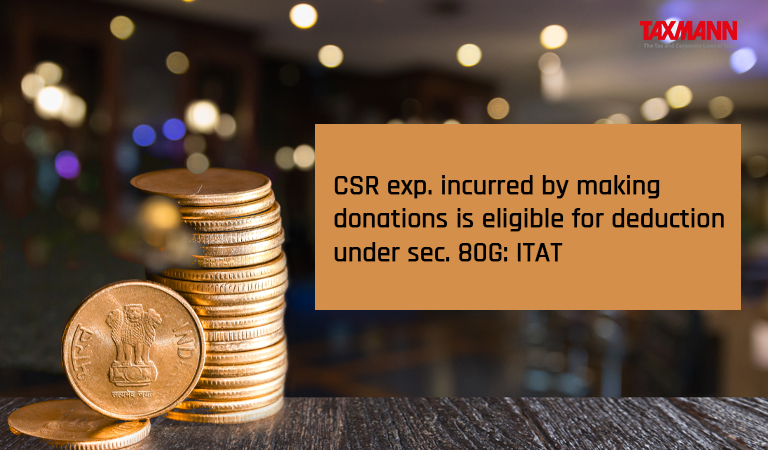CSR exp. incurred by making donations is eligible for deduction under sec. 80G: ITAT
- Blog|News|Income Tax|
- 2 Min Read
- By Taxmann
- |
- Last Updated on 18 September, 2021

Case details: JMS Mining (P.) Ltd. v. PCIT - [2021] 130 taxmann.com 118 (Kolkata - Trib.)
Judiciary and Counsel Details
-
- P. M. Jagtap, Vice-President and A.T. Varkey, Judicial Member.
- S.K. Tulsiyan , Adv. for the Appellant.
- Dinesh Aibor , Jayal Sawkuie, CIT for the Respondent.
Facts of the Case
The assessee-company was a mining service provider engaged in the business of management and operation of mines. The assessee claimed deduction under section 80G on account of donation of sum of certain amount which was given to Shree Charity Trust and a sum of certain amount which was given to Pt. Jasraj Music Academy Trust as contribution towards Corporate Social Responsibility (CSR) activities. The Assessing Officer (AO) allowed same.
However, the Principal Commissioner invoked revision jurisdiction under section 263 on ground that the action of the AO to allow deduction of CSR expenses under section 80G was erroneous because CSR expenditure could not be allowed as per express prohibition given under Explanation 2 to sub-section (1) of section 37. Aggrieved-assessee filed the instant appeal before the Tribunal.
ITAT Held
The Tribunal held that from a plain reading of the Explanation 2 to section 37(1) says that expenditure incurred towards CSR activities shall not be allowed as ‘business expenditure’ and shall be deemed to have not been incurred for the purpose of business. The embargo created by this Explanation 2 inserted in section 37 by the Finance (No. 2) Act, 2014 was to deny the deduction for CSR expenses incurred by companies, as and by way of regular business expenditure while computing ‘income under the head business’.
It can be seen that this Explanation 2 to section 37(1), which denies deduction for CSR expenses by way of business expenditure, applies only to the extent of computing ‘business income’ under Chapter IV-D. The said Explanation cannot be extended or imported to CSR contributions which are otherwise eligible for deduction under any other provision or Chapter, to say donations made by charitable trust registered under section 80G.
Further, the Parliament intended certain restrictions to only CSR expenditure in respect of two donations included by an assessee as CSR expenditure, i.e., Swachh Bharat Kosh and Clean Ganga Fund. It has impliedly not made any prohibition/restriction in respect of the claim of CSR expenses in other cases if it is otherwise eligible under section 80G.
In this context, it was found that the assessee had made donation by RTGS through bank, which was received by Shree Charity Trust, which was approved under section 80G(5)(vi). Further assessee had made payment to Pt. Jashraj Music Academy Trust which was also approved under section 80G(5)(vi). Therefore, the assessee’s claim for deduction of CSR expenses/contribution under section 80G was to be allowed.
Case Review
-
- Malabar Industries Ltd. v. CIT [2000] 109 Taxman 66/243 ITR 83 (SC) (para 14) followed.
List of Cases Referred to
-
- Goldman Sachs Services (P.) Ltd. v. Jt. CIT [2020] 117 taxmann.com 535 (Bang. – Trib.) (para 6)
- Allegis Services (India) (P.) Ltd. v. Asstt. CIT [IT Appeal No. 1693 (Bang.) of 2019, dated 29-4-2020] (para 7)
- FNF India (P.) Ltd. v. Asstt. CIT [IT Appeal No. 1565 (Bang.) of 2019, dated 5-1-2021] (para 8)
- Malabar Industries Ltd. v. CIT [2000] 109 Taxman 66/243 ITR 83 (SC) (para 14).
Disclaimer: The content/information published on the website is only for general information of the user and shall not be construed as legal advice. While the Taxmann has exercised reasonable efforts to ensure the veracity of information/content published, Taxmann shall be under no liability in any manner whatsoever for incorrect information, if any.

Taxmann Publications has a dedicated in-house Research & Editorial Team. This team consists of a team of Chartered Accountants, Company Secretaries, and Lawyers. This team works under the guidance and supervision of editor-in-chief Mr Rakesh Bhargava.
The Research and Editorial Team is responsible for developing reliable and accurate content for the readers. The team follows the six-sigma approach to achieve the benchmark of zero error in its publications and research platforms. The team ensures that the following publication guidelines are thoroughly followed while developing the content:
- The statutory material is obtained only from the authorized and reliable sources
- All the latest developments in the judicial and legislative fields are covered
- Prepare the analytical write-ups on current, controversial, and important issues to help the readers to understand the concept and its implications
- Every content published by Taxmann is complete, accurate and lucid
- All evidence-based statements are supported with proper reference to Section, Circular No., Notification No. or citations
- The golden rules of grammar, style and consistency are thoroughly followed
- Font and size that’s easy to read and remain consistent across all imprint and digital publications are applied



 CA | CS | CMA
CA | CS | CMA
